
<< Back to Annual Report Main Page
A galvanizing event. A foundational idea. A deep learning experience. The patient work of building and tending an intellectual community. We asked our affiliated faculty and students to identify one highlight from the 2022-23 academic year that captures why they do what they do. Here are their varied responses.
Entanglement Project
A new initiative at the FHI interrogating the entanglements of race, health, and the environment.

Michaeline Crichlow (African and African American Studies) convenes the CCDGB in collaboration with Denise Ferreira da Silva (Institute for Gender, Race, Sexuality, and Social Justice, University of British Columbia). In response to our prompt for a 2022-23 highlight, Crichlow selected "Slave Plantation: Environment, History and Cycles of Capital Accumulation," a lecture by historical sociologist Dale Tomich (Binghamton University, emeritus).
Dale Tomich’s discussion of plantations spanning the 16th to the 19th centuries was a central event in the CCDGB program, elucidating with rare and nuanced detail the history of plantations in the world, and opening conversations about the planetary transformations that they have occasioned (and still do) in the world. Read her full reflection here >>
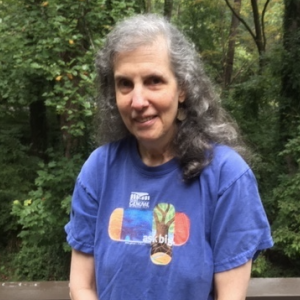
Convened by Priscilla Wald (English), Strange Life is one of three strands of the Entanglement Project. Members of the Strange Life working group include: Taylor Black (English), JP Gritton (English), Shambhavi Kaul (Art, Art History and Visual Studies), Douglas Jones (English), Sharon Kunde (ACLS Emerging Voices Fellow, FHI), Mesha Maren (English), Anna Storti (Gender, Sexuality and Feminist Studies), and Yun Emily Wang (Music).
We would nominate as the highlight of the Strange Life working group the way we began to see a conversation emerging among our very different projects. We started loosely, without a name, and decided each member would be responsible for one session — present work or facilitate a conversation around a reading or viewing or whatever else we could think of — and we would each also come up with a public event to organize or co-organize. We were interested to see what evolved and to name ourselves accordingly. The richness of the conversations — and entanglements — that emerged were, to my mind, the highlight of the group; we gradually came to recognize a collective fascination with the strange and anomalous, specifically the strangeness we think of as life itself, hence our collective decision to call ourselves Strange Life.
Humanities Laboratories
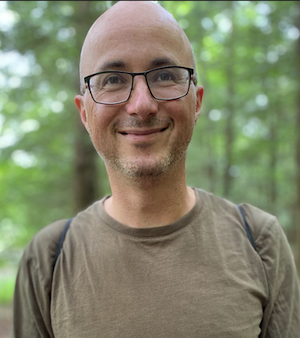
Gustavo Furtado (Romance Studies) is Co-Director of the Amazon Lab along with Christine Folch (Cultural Anthropology) and Paul Baker (Nicholas School of the Environment, emeritus).
This is a tough question because the lab had many great events last year, such as “An Inter-american Conversation on Indigeneity, Art, and Education,” which brought together two indigenous visual artists, one from Brazil and another from North Carolina. This encounter between North and South, art and education, via indigeneity, was really generative — and hopefully will be repeated in some form.
But I think the absolute highlight of the lab were the meetings of the reading group with our visiting scholar, Jamille Pinheiro Dias, in which we focused on the book The Falling Sky: Words by a Yanomami Shaman. Jamille is one of my favorite scholars and collaborators. She is not only intellectually brilliant but also extremely sensitive and generous as a collaborator and interlocutor. The reading group included graduate students from several departments, members of Duke faculty, a few undergraduates, and a few community members not associated with Duke at all, including a visual artist and a retired librarian. The meetings represented one of my ideals for what the university should be: a space where novel ideas can be explored in an environment that is non-hierarchical, collaborative, and truly welcoming of diversity of thought and experience.
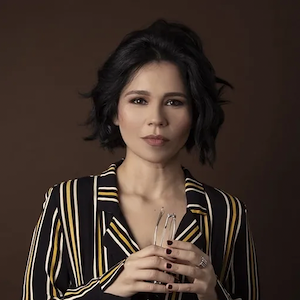
“Non-hierarchical” does not mean uninformed or unguided, of course. Jamille and I shared our own expertise in framing the context for the readings and pointing to some approaches to it, and we provided additional information along the way so that the discussion could be most productive. But otherwise, the meetings consisted in the group’s sincere and open-ended collective thinking about one of the most beautiful and difficult texts that I have ever read. The fact that the text presents a major challenge to traditional disciplines and modes of reading and that it is virtually unclassifiable — it is partly an autobiography, an auto-ethnography, a reverse-ethnography, an apocalyptic prophecy, a literary text, and an eco-poetic manifesto — is part of what makes the meetings of this group extremely significant. My vision for the Lab was less about fomenting the expansion of knowledge about the Amazon than about creating the conditions for Amazonian knowledge to challenge and reshape our disciplinary and cultural assumptions and foundations. I think we succeeded in doing this with the reading group while creating an intellectual community — a personal impression that was confirmed by several participants who told us that this was indeed a special experience.
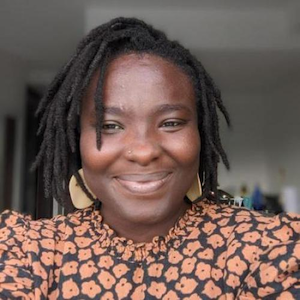
Graduate Assistant for the From Slavery to Freedom Lab, Barbara Ofosu-Somuah is a doctoral student in the Department of Romance Studies.
The conversations, events, and even quiet moments made possible by the FHI were the soundtrack to my first year as a doctoral student at Duke during the 2022-2023 academic year. As the spring semester Graduate Assistant for the Franklin Humanities Institute's From Slavery to Freedom Lab, I was honored to work with Professor Lamonte Aidoo, the lab's co-director and Associate Professor of Romance Studies, to organize a spring master class series. We hosted sessions with Rinaldo Walcott ("Between Reparations and Freedom"), Tracy Sharpley-Whiting ("The Reinvented Life of Belle da Costa Greene"), and E. Patrick Johnson ("Black Queer Studies: A Genealogy"). Bringing these scholars to campus and engaging deeply with their work in a master class format was an incredible opportunity for me, a first-year graduate student who had spent much of my time thinking alongside these scholars. Outside the lab, events like this were frequent at the FHI. I'm deeply grateful for the open access that the Institute provides for members of the Duke community to connect through intellectual, social, and cultural events.
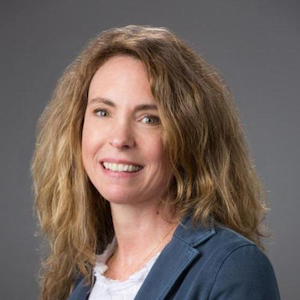
The Manuscript Migration Lab is co-directed by Jennifer Wright Knust (Religious Studies), William A. Johnson (Classical Studies / Dean of Humanities), and J. Andrew Armacost (Rubenstein Library). Here Knust writes on behalf of the Co-Directors.
It is difficult to choose just one event, but, if we must, “Manuscript Fragmentation Across Cultures” was a particular highlight. This event brought scholars, librarians, students, and other researchers together to discuss “fragmentology” across cultures. Organized by affiliates Matthew Hayes and Clare Woods, this roundtable featured presentations by Lisa Fagin Davis (Medieval Academy of America), Christopher Nugent (Williams College), and Akiko Walley (University of Oregon) and considered fragmented Latin manuscripts in collections in the United States (Fagin Davis), fragmented copies of the Repository of Rabbit Garden Questions found in Dunhuang (Nugent), and the use of sutra fragments in early modern Japan (Walley). There is a wonderful blog about it by Matthew Hayes here.

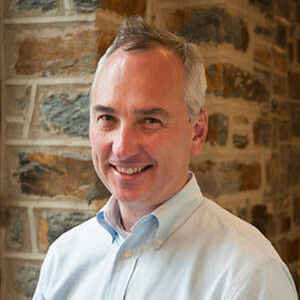
Andy, William, and I are particularly proud of the amazing work of our graduate student affiliates. Their research has been truly inspiring, as the exhibition in the Mary Duke Biddle Room illustrates (see more in Lab Graduate Coordinator Michael Freeman's highlight below). Maroun El Houkayem's essay "Orientalism, Disorientation, and the 'Other Side of the World'" came out this year and does an amazing job at helping us think about what we are trying to do and why. Maroun addresses his own journey as a scholar from the “other side of the world” and Arabic manuscripts encountered at Duke play a central role in the piece.

Graduate Coordinator for the Manuscript Migration Lab in 2022-23, Michael Freeman is a doctoral student in Classical Studies.
As Graduate Coordinator of the Franklin Humanities Institute’s Manuscript Migration Lab, I achieved a dream that I had held in my sights since the beginning my Duke career: I helped curate an exhibit in the Duke Library’s Mary Duke Biddle Room.
Our exhibit, like our lab, aims to put “people first.” Our manuscripts are fascinating pieces of cultural heritage in their own right, but they also tell stories about the people whose lives they have touched. By elevating each individual affiliate’s vision for their own story and manuscript, we were able to create a narrative that feels both rich in its research as well as deeply personal and human.
I am often asked what it means to be in a “humanities lab.” I of course speak to the inestimable value of working as part of such a collaborative and interdisciplinary team. Even more valuable in my eyes, however, is that our lab is not just a place that supports its research but a community that supports its people.
Our lab began in the early days of the COVID-19 pandemic. During this isolating time, I sincerely looked forward to logging into our weekly lab meetings, sipping early-morning coffee with my affiliates, discussing our research, our graduate work, our frustrations, our victories. The Manuscript Migration Lab gave us camaraderie, connection, and community when all were in short supply. My MML affiliates remain my dear friends on campus and around the globe, my go-to colleagues and contacts across departments and disciplines.
Our exhibit, “Manuscript Migration: The Multiple Lives of the Rubenstein Library’s Collection” (on view August 11, 2023 to February 3, 2024) is a celebration of the research our lab has accomplished. It is also a celebration of our lab itself, of the people who have chosen to put each other first throughout a challenging but also enriching few years.
FHI Faculty & FEllows
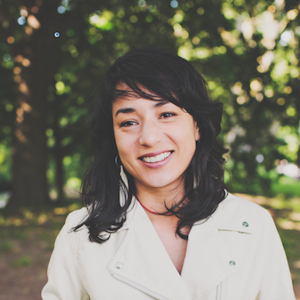
Saskia Cornes is FHI Assistant Professor of the Practice and Program Director of the Duke Campus Farm.
Through our inaugural Soil Fertility Fellowships, I’m working with another FHI affiliate, Dan Richter, to launch a team of graduate and undergraduate researchers with the aim of converging two (or possibly even three) different epistemologies of the land. On the one hand, the felt and lived experience of working with soil through the daily praxis of small-scale agriculture; on the other, the quantitative approach of the Richter Soils Lab that can read the soils of the Duke Campus Farm on annual, decadal, and centuries-long timescales. Using both of these lenses and rhythms, we are seeing our acre more clearly as an archive of over two hundred years of plantation agriculture and enslaved labor, and also as a site of thousands of hours of regenerative practice, primarily by students and community members. We’re understanding the affordances of sustainable agriculture, what it can and cannot do, materially, culturally and spiritually, more deeply. This is one of the things that’s exciting me most: the continued expansion of what we mean by interdisciplinary teaching and research at the Duke Campus Farm. I’ve also been honing my thinking on the Duke Campus Farm as a georgic space, particularly in light of accelerating awareness and anxiety around climate change. Part of this is about the actual embodied work of agriculture, another is about a particular humility vis-à-vis futurity and the more-than-human world. More and more, we’re working with young people aching to feel some sense of self-efficacy in the wake of an uncertain planetary future. Offering an embodied sense that a reparative relationship with the more-than-human world is possible, even available, remains a key motivation for my work.
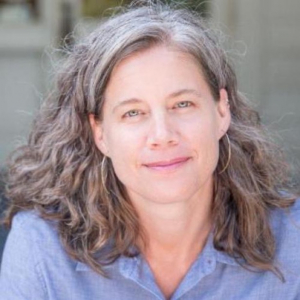
Wesley Hogan is Research Professor at the FHI.
The overturning of Roe v. Wade in June 2022 shook the US political environment like an earthquake. Its dramatic impacts on people’s personal lives spill out every day across headlines, news shows, and on social media.
Less well understood is its immense impact on the medical profession, particularly on OBGYNs, and the way it has put state legislators’ limited medical expertise in the decision-making seat in patient exam rooms across the South. The Supreme Court’s Dobbs decision, for instance, led to the immediate death of one woman in South Carolina and put another in grave danger. The first woman died from sepsis following self-instrumentation, and the second almost died after giving birth to a healthy baby. She began to hemorrhage, and a hospital administrators would not allow her physician to perform the standard D&C procedure to stop the bleeding until multiple providers pled for her life. The administrator was afraid that because “D&C” is the same term used to provide first term abortions, the hospital would be in violation of the new South Carolina criminal law. Immediately, a team of OBGYN physicians at Duke University Hospitals began to see similar cases across the region.
When my colleague and friend, then-head of Duke’s OBGYN residency program, Dr. Beverly Gray, told me about this death and near-death soon after they happened, I was on sabbatical in Berlin. I remember the exact street corner I was on when I got her news. I froze with horror and sadness, imagining the could-have-beens: a lost life, an almost-motherless baby, a young woman bleeding out at the peak of life, and an entire community’s pain and loss. We determined to use our quantitative and qualitative research skills to build an archive documenting the lightning-fast impact of Dobbs on reproductive medicine and women’s health, unfolding largely outside the public eye. Since January 2023, she and I have teamed up with her Duke Family Planning colleague, Dr. Jonas Swartz, to offer a course for Duke students. The course uses oral history, data collection, and communication teams to document—in real time—the medical, political and ethical dimensions of the situation that OBGYN and family medicine healthcare providers now find themselves in. Our early findings: physicians, regardless of political belief, attempt every day to provide women the nationwide “standard of care” for reproductive medicine. Dobbs has significantly limited their ability to do so. Students work to document the effects of the new legislation on women’s healthcare providers, as well as the consequences for women’s and family health across the region.
In addition to the course, Drs. Gray, Swartz, and I worked with two graduate students and five undergraduates on a Story+ team in summer 2023. The team created an information-packed website for our project, as well as launching Instagram and YouTube platforms.
After a dramatic reversal by a single North Carolina state legislator in Spring 2023, the North Carolina State Legislature rolled back medical freedom even further for North Carolinians, restricting abortion care access from 20 weeks to 12 weeks through Senate Bill 20. This law also added multiple unnecessary hurdles to those seeking medical care. For more information, Dr. Rebecca Kreitzer’s policy analysis is quite illuminating. Dr. Gray’s ACLU lawsuit against the bill clarifies why and how the bill interferes with physicians’ ability to provide the nationwide standard of care.
Our work this coming year in the Bass Connections class will document health care workers’ experiences of providing care under the restricted conditions of Dobbs and state bills like SB20 and distribute our findings with medical, legal, law enforcement, and journalist communities. For everyday people looking for accurate information on how to receive standard reproductive care, we also hope our social media channels will disseminate widely such currently-hard-to-find information. FHI’s unparalleled commitment to fostering impactful interdisciplinary research, and Duke Medicine’s determination to provide world-leading reproductive medical care, have made such a vital archive-building project possible.
Suggested Listening: Cover Up’s The Pill Plot (2023), an investigative journalism podcast mini-series. “Back in the ‘90s, a ragtag group plotted an international drug smuggling scheme and set up a secretive lab to cook up tablets. But they weren’t trafficking narcotics—they were fighting to bring the abortion pill to America. The new season of Cover Up—The Pill Plot—will take you inside the epic struggle facing activists who battled presidents, the Supreme Court, militant anti-abortionists, would-be assassins, and murders.” Apple | Spotify
Sharon Kunde is the ACLS Emerging Voices Postdoctoral Fellow at the FHI for 2022-23 and 2023-24. In addition to participating in Strange Life, she organized a weekly writing group for humanities postdocs.
On a Thursday afternoon in early spring, the Entanglement Project's Strange Life seminar gathered in FHI's Conference Room to discuss a group member's work in progress: a talk about registering silence in the context of ethnographic research. The paper went on to link the notion of silence as a point of potential contact between researcher and subject with Diana Khoi Nguyen’s Ghost Of, a book of poetry that also wrestles with absences and gaps.
The nourishment provided by the seminar made that afternoon particularly emblematic of life at the Franklin Humanities Institute. First off, there was literal nourishment: the seminar leader treated us to takeout, and others brought home-baked goods and other treats. And even more vitally, there was intellectual nourishment of a special kind. The seminar participants are excited to push outside the boundaries of traditional scholarly inquiry, and our workspace has allowed me to hash through new ideas in conversation with a community of engaged, curious, and genuine thinkers — people who are interested in reimagining rather than replicating the established structures of academic study.
Centers and affiliates
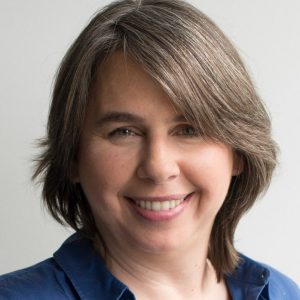
Victoria Szabo (Art, Art History & Visual Studies) has been Director of the Digital Humanities Initiative @ FHI since its inception in 2016.
The Digital Humanities Initiative at FHI was launched in 2016, introducing programming and learning opportunities for faculty, staff, students, and community members engaged with the impact of the digital turn on higher education, scholarly practice, and our broader culture. We sponsored visiting lectures, local conversations, workshops, events, and activities across campus and beyond. Building upon the legacy of the PhD Lab in Digital Knowledge, over the years DHI@FHI brought dozens of Duke graduate students into conversation with each other across the arts, humanities, and interpretative social sciences.
As a physical place, and as a concept, the PhD Lab offered a third space for graduate students interested in exploring the affordances of digital media for the research and its expression, and whose home departments may have had few fellow travelers interested in digital practice, art-science engagements, or computational media critique. Students explored interdisciplinary topics like spatial humanities, sound studies, data analysis and visualization, distant reading and viewing, digital archives and curation, participatory and public research practices, and multimodal authorship. As a community we offered support and consulting, developed teaching opportunities, and provided contact with the wider world of the digital humanities through the HASTAC scholars network, conference support, and targeted programming.
As a founding partner of the interdisciplinary PhD in Computational Media, Arts & Cultures, established in 2016 as part of a major Mellon grant, FHI supported CMAC graduate students and faculty in computational media art exhibitions, working groups, and events centering around critical approaches to computation and culture. DHI@FHI also supported working groups focused on data-driven Computational Humanities in partnership with the Rhodes Information Initiative and the Information Science + Studies Program. We co-sponsored an ACLS Emerging Voices postdoctoral fellow focused on Digital Humanities and the Global South, and co-organized the interdisciplinary, NEH-supported Virtual and Augmented Reality Digital Humanities Institute.
Working with our partners at North Carolina Central University, and with support of a generous grant from the Mellon Foundation, we developed and implemented the NCCU-Duke DH Faculty Fellows program, which involved training and fostering an “alumni” community of scholars who went on to create their own DH Lab and Minor at NCCU, establish a DH institute with Pakistani partners, and win further curriculum development grants of their own from NEH and Mellon.
We gathered through a global pandemic, and continued to engage with our communities virtually – even as the whole world came to appreciate the importance of “digital knowledge” production in whole new ways. As these milestone achievements suggest, seven years on, the digital humanities at Duke has moved well beyond the “initiative” phase, and into more widespread practice across the humanities and interpretive social sciences. DHI@FHI played an integral part in that transformational shift, on campus and beyond. Beginning in 2023-24, rather than maintaining a separate “initiative,” FHI will be integrating support for the critical digital humanities into its ongoing core programs. The ongoing partnerships with CMAC and with NCCU will also remain a priority. While DHI@FHI as a separate initiative is ending, critical approaches to computation and culture will remain an important focus for FHI attention, engagement, and support.

Corin Zaragoza is Program Coordinator for the Duke Human Rights Center @ FHI. The DHRC is co-directed by Robin Kirk (Cultural Anthropology) and Erika Weinthal (Nicholas School of the Environment).
The 2023 Human Rights Certificate seniors, led by James Chappel, focused their spring Capstone course on human rights and prison reform. To accomplish this, they partnered with OurJourney, a North Carolina non-profit that supports formerly incarcerated people in their re-entry to society. The capstone students identified a need to raise awareness within the Duke and Durham community about the difficulties of reentry, so they created a simulation to demonstrate the immense challenges that await newly freed people. The students, along with OurJourney, also created a reentry guide for formerly incarcerated people, which contains information on what resources are available in each NC county and how to access them. The Capstone course encompasses the engaging, thoughtful, and relevant coursework offered by the Duke Human Rights Center that focuses on developing real-world skills and partnering with local organizations.
Another highlight that exemplifies the DHRC's work is this interview between DHRC intern Gargi Mahadeshwar and Duke student Anna Muthalaly, who spoke on a panel after the Rights! Camera! Action! Film Series screening of the documentary Reversing Roe.
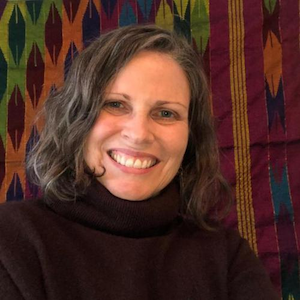
Margaret (Lou) Brown is Program Director of the Forum for Scholars and Publics (aka Forum@FHI).
In her exit interview, Elizabeth Schrader Polczer, the 2022-23 Anne Firor Scott Public Scholarship Fellow, said that her fellowship activities with the Forum provided her the opportunity “to practice ways of sharing information that weren't necessarily based on my own research. The fellowship gave me the opportunity to show hospitality to some of the best public scholars in my field as I learned from them about how they do their work.” Elizabeth also expressed appreciation for the ways her guests made audience members feel attended to. “That was something that I could learn from: When you're speaking to something that really deeply resonates with your audience, how do you care for them?”
Elizabeth’s four-conversation series, “Contemporary Conversations in Christianity,” brought out large audiences and gave the Forum the chance to meet people in person again after three years of mostly on-line programming. Each event explored a topic of pressing importance to scholars of Christianity as well as to practicing and former members of Christian denominations. We’re thrilled with those outcomes. But what makes this series a highlight of the year at the Forum is reflected in Libbie’s comments: Our work has always approached public scholarship as something more than dissemination of scholarly ideas. We emphasize scholarly listening as much as — if not more than — speaking.

We’ve always tried to infuse our programs with a spirit of hospitality, so it was gratifying to observe Elizabeth embody that spirit as she developed her series. She was rigorously prepared prior to each event and had communicated clearly and regularly with her guests and the team at the Forum as plans were finalized. She was a generous host and interlocutor – engaged, thoughtful, and relaxed as she led guests and audience members through complex ideas. When done well, it all looks easy and commonsense, but most of us have experienced the difference between an event prepared with care and one that isn’t, even if we can’t quite put our finger on the distinguishing factors. I was grateful to be able to support a series that was built on a foundation of both listening and sharing.

Season 13 of Left of Black was momentous not only because the program was nominated for a coveted Webby Award but because we got the chance to be out in the world and continue to do good work (or get into “Good Trouble” as John Lewis would call it). Three years after nearly shuttering the operation, we were able to be back in the world, producing signature episodes with partners at Rofhiwa Book Cafe and the From Slavery to Freedom Lab, and the opportunity for the team to shoot episodes in various campus locations including Duke Chapel, GSF Blue Parlor, Duke Coffee House as well as our institutional home. Highlights included episodes with former Trinity Dean Karla F.C. Holloway, who was in conversation with legendary songstress Nnenna Freelon, noted historian Robin. D.G. Kelley and Grammy-Award winners Carlos Simon and 9th Wonder (Patrick Douthit).
Left of Black was intended as an intervention, another way to make the work of the mind – The Black Mind – accessible to those who would never have access to The Academy, a way to untether Black Studies from formal institutions and traditional notions of producing and consuming knowledge, and especially at a time when “Black Thought'' is under assault; we’d like to think that we’ve been devout to these goals.
Summer programs
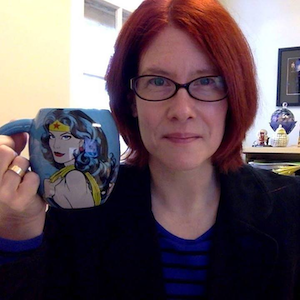
Jules Odendahl-James is Director of Academic Engagement in the Arts & Humanities at Duke. She has been a vital part of Story+ since 2017, co-directing the program with Amanda Starling Gould until 2022 and with Lou Brown for the summer 2023 edition.
In my 7th and final summer co-directing Story+ I am pleased to see just how many of the goals initially outlined for a summer-session, stipend-based, team-based research experience in the arts and humanities for undergraduates and graduate students have been achieved. And, when necessary, how these goals have been amended in ways that provide participants with unique and valuable hands-on research experiences individually and collectively.
Being fully on-campus in shared and individual spaces this summer allowed for the frisson of unplanned connections — a feeling somewhat missing from our remote summers. What we learned from remote work, however, were ways to implement accountability structures, key technological tools to support collaborative digital work, and the power of connection across space and time. That wisdom informed our return to campus and enriched our shared experiences, particularly our field trips to different archival spaces (such as the Duke Campus Farm, performance studios, the sidewalks and landmarks of Durham). The varied concluding artifacts the teams created — podcast pilot, social media campaigns, tailored costumes, exhibition plans — also reinforced a core dynamic of Story+: to share experience and information with a range of audiences.
Many of this summer’s participants have found ways to continue their inquiries either with their project leaders or within the disciplinary fields or topics they engaged in Story+. That fact perhaps signals the pinnacle of achievement for this opportunity, something that I hope continues into the program’s future.

Nikki Locklear is a doctoral student in the Department of History.
In 2023, I participated in Story+ at FHI for the third summer — in a new role this time. As graduate assistant for Story+ at large, I got a novel vantage on a familiar program I’ve come to love. This position allowed me to spend six weeks working alongside Lou Brown, Jules Odendahl-James, and the FHI staff members who make Story+ possible each year. I joined them in the many behind-the-scenes efforts on which student research opportunities at Duke rely.
Supporting this year’s graduate student project managers as they fulfilled their own essential roles formed the heart of my job. What made this work special was that it required I reflect on my own past experiences as a project manager. Rather than focusing on one project, I facilitated discussions with my peers about how our diverse experiences could benefit humanistic research across six equally diverse teams. Being fully in-person for the first time in my Story+ history meant, crucially, that I could experience the program’s community aspect in a new way, too.
Beyond other graduate students, I learned immensely from Story+’s co-directors. With their support, I helped plan weekly guest presentations to expand the intellectual community for our participants as well as conceptualized a final symposium to showcase the research processes of our teams. The co-directors modeled approaching the position’s administrative and intellectual dimensions with care, compassion, and creativity; in doing so, they and Story+ in general gave me a valuable glimpse of what my post-graduate school professional future could look like.